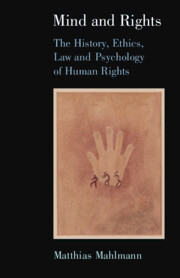Refine search
Actions for selected content:
6 results
Introduction
-
- Book:
- Mind and Rights
- Published online:
- 09 February 2023
- Print publication:
- 16 February 2023, pp 1-40
-
- Chapter
-
- You have access
- Open access
- HTML
- Export citation
Epilogue
- from Part III - Rights and Moral Cognition
-
- Book:
- Mind and Rights
- Published online:
- 09 February 2023
- Print publication:
- 16 February 2023, pp 462-468
-
- Chapter
-
- You have access
- Open access
- HTML
- Export citation

Mind and Rights
- The History, Ethics, Law and Psychology of Human Rights
-
- Published online:
- 09 February 2023
- Print publication:
- 16 February 2023
-
- Book
-
- You have access
- Open access
- Export citation
Epilogue
-
- Book:
- Poland's Solidarity Movement and the Global Politics of Human Rights
- Published online:
- 28 May 2021
- Print publication:
- 10 June 2021, pp 217-232
-
- Chapter
- Export citation
Part I - Genealogies and Contexts
-
- Book:
- The Cambridge Companion to Human Rights and Literature
- Published online:
- 24 June 2019
- Print publication:
- 11 July 2019, pp 11-72
-
- Chapter
- Export citation
1 - Recounting History, Locating Precursors for Human Rights
- from Part I - Genealogies and Contexts
-
-
- Book:
- The Cambridge Companion to Human Rights and Literature
- Published online:
- 24 June 2019
- Print publication:
- 11 July 2019, pp 13-26
-
- Chapter
- Export citation
